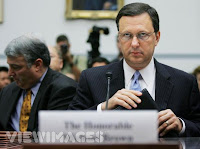 Penguin Young Readers Group, which helps educate our nation's youth about the value of buying books instead of checking them out of libraries, is even sponsoring a "Write Like Mike" contest. Kids will be asked to write a sports column (hopefully with more substance than Lupica's columns) and the winning writer gets $1,000 and a spot in Sports Illustrated for Kids. I like the idea, but shouldn't they have another "Write Like Mike" contest where kids write "middle-grade" sports novels for $1,000? My writing might be aptly described as "middle-grade" and I could definitely use $1,000. All I would have to do is find some dopey kid to "enter" my book in the competition. Don't worry, I'd cut him in for twenty bucks or something.
Penguin Young Readers Group, which helps educate our nation's youth about the value of buying books instead of checking them out of libraries, is even sponsoring a "Write Like Mike" contest. Kids will be asked to write a sports column (hopefully with more substance than Lupica's columns) and the winning writer gets $1,000 and a spot in Sports Illustrated for Kids. I like the idea, but shouldn't they have another "Write Like Mike" contest where kids write "middle-grade" sports novels for $1,000? My writing might be aptly described as "middle-grade" and I could definitely use $1,000. All I would have to do is find some dopey kid to "enter" my book in the competition. Don't worry, I'd cut him in for twenty bucks or something.Here are my ideas for preteen-oriented, sports-themed novels that would make Lupica proud, along with lessons children can learn from my books:
A Recruit Called Hope- All Johnny wants to do is play basketball for State, but the coach can't contact him thanks to NCAA recruiting regulations. With the help of his computer savvy buddy Alan, Johnny is able to send illegal emails to the coach and secure his partial scholarship. All goes well until the star player from the neighboring suburb rats Johnny out to the NCAA Rules Commission. Relegated to junior college, Johnny must earn his way to State the hard way, by playing great basketball. Unfortunately, he tears his ACL his second year in ju-co and lives out his life in obscurity.
Kids learn the ineluctable role chance plays in everyone's life.
Benchwarmer- Arthur was the best quarterback in Paradiso High history. He had everything: the scholarship offers, the fans, he was even dating the captain of the cheerleading team. But one day a transfer student arrives and threatens Arthur's starting spot. Soon all the scouts are watching the young upstart instead of Arthur, who is left rotting on the bench. When his new adversary takes the team all the way to the state championship game and, worse still, steals Arthur's girl, Arthur knows he must act. He manages to plant beer in the new quarterback's car, getting him expelled and out of the picture. Arthur reclaims his place as quarterback but his rusty play dooms the team to a miserable defeat in the championship. Overcome by guilt, he considers fessing up to his crime until his girlfriend returns to his arms on prom night. He loses his virginity to her and realizes that God had a plan all along.
Kids discover that perseverance and cunning can prevail over justice. They also learn that sex heals the deepest wounds -- even self-inflicted ones.





